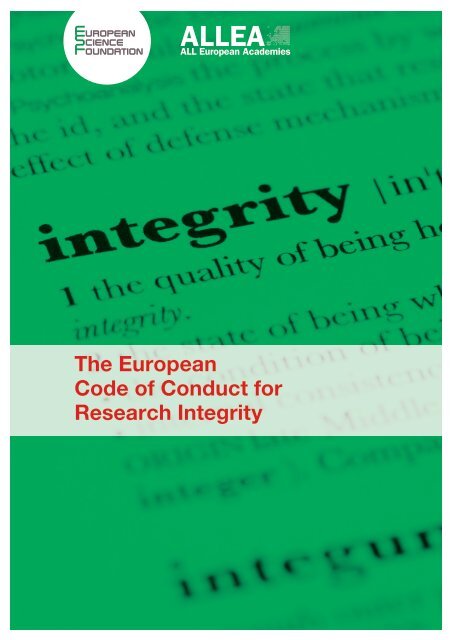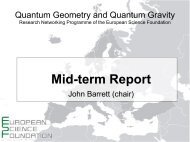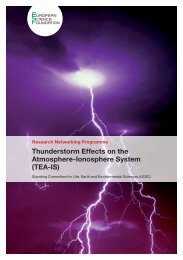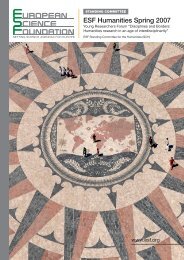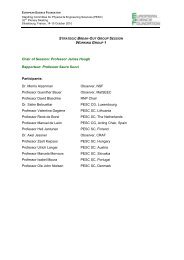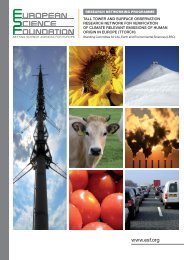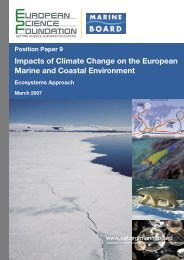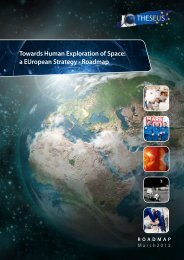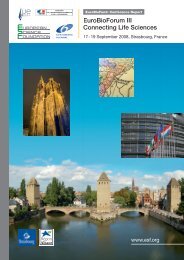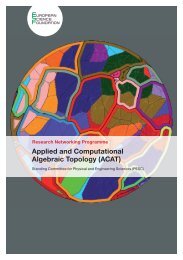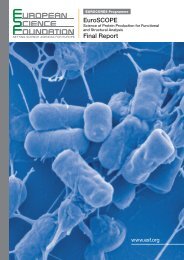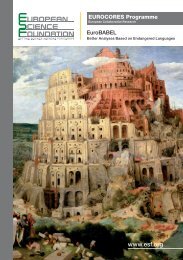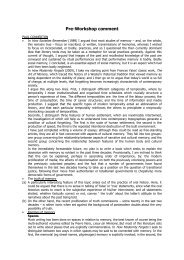The European Code of Conduct for Research Integrity
The European Code of Conduct for Research Integrity
The European Code of Conduct for Research Integrity
- No tags were found...
Create successful ePaper yourself
Turn your PDF publications into a flip-book with our unique Google optimized e-Paper software.
<strong>European</strong> Science Foundation<strong>The</strong> <strong>European</strong> Science Foundation (ESF) wasestablished in 1974 to provide a common plat<strong>for</strong>m<strong>for</strong> its Member Organisations to advance <strong>European</strong>research collaboration and explore new directions <strong>for</strong>research. It is an independent organisation, owned by78 Member Organisations, which are research fundingorganisations and research per<strong>for</strong>ming organisations,academies and learned societies from 30 countries.ESF promotes collaboration in research itself, infunding <strong>of</strong> research and in science policy activities atthe <strong>European</strong> level.www.esf.orgALLEA (All <strong>European</strong> Academies)ALLEA (All <strong>European</strong> Academies) is the <strong>European</strong>Federation <strong>of</strong> National Academies <strong>of</strong> Sciences andHumanities whose 53 Member Academies in 40countries are self-governing communities <strong>of</strong> scientistsand scholars. It was founded in 1994 to promote theexchange <strong>of</strong> in<strong>for</strong>mation and experience betweenAcademies; to <strong>of</strong>fer <strong>European</strong> science and societyadvice from its Member Academies; and to promoteexcellence and high ethical standards in science andscholarship.www.allea.orgCover picture: © iStockMarch 2011ISBN: 978-2-918428-37-4Printing: Ireg – Strasbourg
ContentsForeword 31. Executive Summary 51.1 <strong>The</strong> <strong>Code</strong> 51.2 <strong>The</strong> Principles <strong>of</strong> <strong>Research</strong> <strong>Integrity</strong> 51.3 Misconduct 61.4 Good <strong>Research</strong> Practices 62. <strong>The</strong> <strong>European</strong> <strong>Code</strong> <strong>of</strong> <strong>Conduct</strong> <strong>for</strong> <strong>Research</strong> <strong>Integrity</strong> 82.1 <strong>The</strong> <strong>Code</strong> <strong>of</strong> <strong>Conduct</strong> 82.2 Background and Elucidation 92.3 Guidelines <strong>for</strong> Good Practice Rules 132.4 International Collaborative <strong>Research</strong> 152.5 Annexes 15Annex I: Recommended Principles <strong>for</strong> Investigating <strong>Research</strong> MisconductAnnex II: Boilerplate text <strong>for</strong> International Agreements, as suggested by the OECD Global Science ForumCoordinating Committee <strong>for</strong> facilitating international misconduct investigations3. ESF Member Organisation Forum on <strong>Research</strong> <strong>Integrity</strong> and list <strong>of</strong> members 174. ALLEA Standing Committee on Science and Ethics and list <strong>of</strong> members 19
Forewordl l lScience is expected to enlarge mankind’s knowledgebase, provide answers to global challenges,and guide decisions that shape our societies. Yetwhen science is compromised by fraudulent activities,not only the research enterprise stumbles, butalso society’s trust in it. Thus, researchers and leadersthroughout the world should ensure that scienceis trustworthy to our best knowledge. This can beachieved by education, promoting a culture <strong>of</strong> integrity,and by development <strong>of</strong> and compliance withjoint rules and norms.In this remit, the <strong>European</strong> Science Foundationhas fostered research integrity since its inception,but in a more explicit manner since 2000 when itpublished a landmark science policy briefing on recommendationson best practices, ‘Good ScientificPractice in <strong>Research</strong> and Scholarship’. One <strong>of</strong> therecommendations envisages, as an important task<strong>for</strong> the National Academies, the <strong>for</strong>mulation <strong>of</strong>codes <strong>of</strong> good scientific practice. At the <strong>European</strong>level ALLEA (ALL <strong>European</strong> Academies – the<strong>European</strong> Federation <strong>of</strong> 53 National Academies <strong>of</strong>Sciences and Humanities) adapted a Dutch documentfrom the Royal Netherlands Academy into the‘Memorandum on Scientific <strong>Integrity</strong>’ (2003), whichhas been translated into several languages and is inuse in many countries today.ESF continued to promote international debatearound this topic by organising in 2007 the FirstWorld Conference on <strong>Research</strong> <strong>Integrity</strong>, togetherwith the Office <strong>for</strong> <strong>Research</strong> <strong>Integrity</strong> <strong>of</strong> the USPublic Health Service, which brought together theleading international stakeholders in the field andhighlighted the need <strong>for</strong> international collaborationand consensus. In 2008, a survey was carriedout on research integrity structures, ‘Stewards <strong>of</strong><strong>Integrity</strong> – Institutional Approaches to Promoteand Safeguard Good <strong>Research</strong> Practice in Europe’.A dedicated debate plat<strong>for</strong>m was then set up, an ESFMember Organisation Forum on <strong>Research</strong> <strong>Integrity</strong>,that assembled 31 research funding and per<strong>for</strong>mingorganisations from 22 countries, together withALLEA. <strong>The</strong> work <strong>of</strong> this group produced the consensusdocument ‘<strong>The</strong> <strong>European</strong> <strong>Code</strong> <strong>of</strong> <strong>Conduct</strong><strong>for</strong> <strong>Research</strong> <strong>Integrity</strong>’, launched at the SecondWorld Conference on <strong>Research</strong> <strong>Integrity</strong> held inJuly 2010. <strong>The</strong> <strong>Code</strong> addresses the proper conductand principled practice <strong>of</strong> systematic research inthe medical, natural and social sciences and thehumanities. It stands as a canon <strong>for</strong> self-regulationwith clear recommendations, and is now on the wayto being taken as a reference template <strong>for</strong> implementationthroughout Europe. It is not intended toreplace existing national or academic guidelines, butto represent a Europe-wide agreement on a set <strong>of</strong>principles and priorities <strong>for</strong> the research community.<strong>The</strong> <strong>Code</strong> is provided in this booklet in two <strong>for</strong>ms,the Executive Summary and the full <strong>Code</strong>.Human curiosity and science are borderless,and so must be the policies that surround them.Global research collaboration is unthinkablewithout a common understanding <strong>of</strong> the rules <strong>of</strong>integrity. This is why the next step is to develop aninternational <strong>Code</strong> <strong>of</strong> <strong>Conduct</strong> <strong>for</strong> scientists andstakeholders worldwide.Pr<strong>of</strong>essor Marja MakarowChief Executive, ESFPr<strong>of</strong>essor Jüri EngelbrechtPresident, ALLEA3<strong>The</strong> <strong>European</strong> <strong>Code</strong> <strong>of</strong> <strong>Conduct</strong> <strong>for</strong> <strong>Research</strong> <strong>Integrity</strong>
1.Executive Summaryl l l1.1 <strong>The</strong> <strong>Code</strong><strong>Research</strong>ers, public and private research organisations,universities and funding organisations mustobserve and promote the principles <strong>of</strong> integrity inscientific and scholarly research.<strong>The</strong>se principles include:• honesty in communication;• reliability in per<strong>for</strong>ming research;• objectivity;• impartiality and independence;• openness and accessibility;• duty <strong>of</strong> care;• fairness in providing references and givingcredit; and• responsibility <strong>for</strong> the scientists and researchers<strong>of</strong> the future.Universities, institutes and all others who employresearchers, as well as agencies and organisationsfunding their scientific work, have a duty to ensurea prevailing culture <strong>of</strong> research integrity. Thisinvolves clear policies and procedures, training andmentoring <strong>of</strong> researchers, and robust managementmethods that ensure awareness and application <strong>of</strong>high standards as well as early identification and,wherever possible, prevention <strong>of</strong> any transgression.Fabrication, falsification and the deliberate omission<strong>of</strong> unwelcome data are all serious violations<strong>of</strong> the ethos <strong>of</strong> research. Plagiarism is a violation<strong>of</strong> the rules <strong>of</strong> responsible conduct vis-à-vis otherresearchers and, indirectly, harmful <strong>for</strong> science aswell. Institutions that fail to deal properly with suchwrongdoing are also guilty. Credible allegationsshould always be investigated. Minor misdemeanoursshould always be reprimanded and corrected.Investigation <strong>of</strong> allegations should be consistentwith national law and natural justice. It should befair, and speedy, and lead to proper outcomes andsanctions. Confidentiality should be observed wherepossible, and proportionate action taken where necessary.Investigations should be carried through toa conclusion, even when the alleged defaulter hasleft the institution.Partners (both individual and institutional) ininternational collaborations should agree be<strong>for</strong>ehandto cooperate to investigate suspected deviationfrom research integrity, while respecting the lawsand sovereignty <strong>of</strong> the states <strong>of</strong> participants. In aworld <strong>of</strong> increasing transnational, cross-sectionaland interdisciplinary science, the work <strong>of</strong> OECD’sGlobal Science Forum on Best Practices <strong>for</strong> EnsuringScientific <strong>Integrity</strong> and Preventing Misconduct canprovide useful guidance in this respect.1.2 <strong>The</strong> Principles <strong>of</strong> <strong>Research</strong><strong>Integrity</strong><strong>The</strong>se require honesty in presenting goals and intentions,in reporting methods and procedures and inconveying interpretations. <strong>Research</strong> must be reliableand its communication fair and full. Objectivityrequires facts capable <strong>of</strong> pro<strong>of</strong>, and transparency inthe handling <strong>of</strong> data. <strong>Research</strong>ers should be independentand impartial and communication withother researchers and with the public should be openand honest. All researchers have a duty <strong>of</strong> care <strong>for</strong>the humans, animals, the environment or the objectsthat they study. <strong>The</strong>y must show fairness in providingreferences and giving credit <strong>for</strong> the work <strong>of</strong> othersand must show responsibility <strong>for</strong> future generations intheir supervision <strong>of</strong> young scientists and scholars.5<strong>The</strong> <strong>European</strong> <strong>Code</strong> <strong>of</strong> <strong>Conduct</strong> <strong>for</strong> <strong>Research</strong> <strong>Integrity</strong>
1.3 Misconduct1.4 Good <strong>Research</strong> Practices6<strong>The</strong> <strong>European</strong> <strong>Code</strong> <strong>of</strong> <strong>Conduct</strong> <strong>for</strong> <strong>Research</strong> <strong>Integrity</strong><strong>Research</strong> misconduct is harmful <strong>for</strong> knowledge. Itcould mislead other researchers, it may threatenindividuals or society – <strong>for</strong> instance if it becomesthe basis <strong>for</strong> unsafe drugs or unwise legislation –and, by subverting the public’s trust, it could leadto a disregard <strong>for</strong> or undesirable restrictions beingimposed on research.<strong>Research</strong> misconduct can appear in many guises:• Fabrication involves making up results and recordingthem as if they were real;• Falsification involves manipulating research processesor changing or omitting data;• Plagiarism is the appropriation <strong>of</strong> other people’smaterial without giving proper credit;• Other <strong>for</strong>ms <strong>of</strong> misconduct include failure to meetclear ethical and legal requirements such as misrepresentation<strong>of</strong> interests, breach <strong>of</strong> confidentiality,lack <strong>of</strong> in<strong>for</strong>med consent and abuse <strong>of</strong> researchsubjects or materials. Misconduct also includesimproper dealing with infringements, such asattempts to cover up misconduct and reprisals onwhistleblowers;• Minor misdemeanours may not lead to <strong>for</strong>malinvestigations, but are just as damaging given theirprobable frequency, and should be corrected byteachers and mentors.<strong>The</strong> response must be proportionate to the seriousness<strong>of</strong> the misconduct: as a rule it must bedemonstrated that the misconduct was committedintentionally, knowingly or recklessly. Pro<strong>of</strong>must be based on the preponderance <strong>of</strong> evidence.<strong>Research</strong> misconduct should not include honesterrors or differences <strong>of</strong> opinion. Misbehaviour suchas intimidation <strong>of</strong> students, misuse <strong>of</strong> funds andother behaviour that is already subject to universallegal and social penalties is unacceptable as well, butis not ‘research misconduct’ since it does not affectthe integrity <strong>of</strong> the research record itself.<strong>The</strong>re are other failures to adhere to good practices– incorrect procedures, faulty data management, etc.– that may affect the public’s trust in science <strong>The</strong>seshould be taken seriously by the research communityas well. Accordingly, data practices shouldpreserve original data and make it accessible to colleagues.Deviations from research procedures includeinsufficient care <strong>for</strong> human subjects, animals or culturalobjects; violation <strong>of</strong> protocols; failure to obtainin<strong>for</strong>med consent; breach <strong>of</strong> confidentiality, etc.It is unacceptable to claim or grant undeservedauthorship or deny deserved authorship. Otherpublication-related lapses could include repeatedpublication, salami-slicing or insufficient acknowledgement<strong>of</strong> contributors or sponsors. Reviewersand editors too should maintain their independence,declare any conflicts <strong>of</strong> interest, and be wary<strong>of</strong> personal bias and rivalry. Unjustified claims<strong>of</strong> authorship and ghost authorship are <strong>for</strong>ms <strong>of</strong>falsification. An editor or reviewer who purloinsideas commits plagiarism. It is ethically unacceptableto cause pain or stress to those who take partin research, or to expose them to hazards withoutin<strong>for</strong>med consent.While principles <strong>of</strong> integrity, and the violationthere<strong>of</strong>, have a universal character, some rules <strong>for</strong>good practice may be subject to cultural differences,and should be part <strong>of</strong> a set <strong>of</strong> national or institutionalguidelines. <strong>The</strong>se cannot easily be incorporated intoa universal code <strong>of</strong> conduct. National guidelines <strong>for</strong>good research practice should, however, considerthe following:1. Data:All primary and secondary data should be storedin secure and accessible <strong>for</strong>m, documented andarchived <strong>for</strong> a substantial period. It should beplaced at the disposal <strong>of</strong> colleagues. <strong>The</strong> freedom<strong>of</strong> researchers to work with and talk to othersshould be guaranteed.2. Procedures:All research should be designed and conductedin ways that avoid negligence, haste, carelessnessand inattention. <strong>Research</strong>ers should tryto fulfil the promises made when they applied<strong>for</strong> funding. <strong>The</strong>y should minimise impact onthe environment and use resources efficiently.Clients or sponsors should be made aware <strong>of</strong> thelegal and ethical obligations <strong>of</strong> the researcher,and <strong>of</strong> the importance <strong>of</strong> publication. Wherelegitimately required, researchers should
espect the confidentiality <strong>of</strong> data. <strong>Research</strong>ersshould properly account <strong>for</strong> grants or fundingreceived.3. Responsibility:All research subjects – human, animal or nonliving– should be handled with respect and care.<strong>The</strong> health, safety or welfare <strong>of</strong> a communityor collaborators should not be compromised.<strong>Research</strong>ers should be sensitive to their researchsubjects. Protocols that govern research intohuman subjects must not be violated. Animalsshould be used in research only after alternativeapproaches have proved inadequate. <strong>The</strong>expected benefits <strong>of</strong> such research must outweighthe harm or distress inflicted on an animal.<strong>The</strong> primary responsibility <strong>for</strong> handling researchmisconduct is in the hands <strong>of</strong> those who employ theresearchers. Such institutions should have a standingor ad hoc committee(s) to deal with allegations<strong>of</strong> misconduct. Academies <strong>of</strong> Sciences and othersuch bodies should adopt a code <strong>of</strong> conduct, withrules <strong>for</strong> handling alleged cases <strong>of</strong> misconduct, andexpect members to abide by it. <strong>Research</strong>ers involvedin international collaboration should agree tostandards <strong>of</strong> research integrity as developed in thisdocument and, where appropriate, adopt a <strong>for</strong>malcollaboration protocol either ab initio or by usingone drafted by the OECD Global Science Forum.4. Publication:Results should be published in an open, transparentand accurate manner, at the earliest possibletime, unless intellectual property considerationsjustify delay. All authors, unless otherwise specified,should be fully responsible <strong>for</strong> the content<strong>of</strong> publication. Guest authorship and ghostauthorship are not acceptable. <strong>The</strong> criteria <strong>for</strong>establishing the sequence <strong>of</strong> authors should beagreed by all, ideally at the start <strong>of</strong> the project.Contributions by collaborators and assistantsshould be acknowledged, with their permission.All authors should declare any conflict <strong>of</strong> interest.Intellectual contributions <strong>of</strong> others shouldbe acknowledged and correctly cited. Honestyand accuracy should be maintained in communicationwith the public and the popular media.Financial and other support <strong>for</strong> research shouldbe acknowledged.7<strong>The</strong> <strong>European</strong> <strong>Code</strong> <strong>of</strong> <strong>Conduct</strong> <strong>for</strong> <strong>Research</strong> <strong>Integrity</strong>5. Editorial responsibility:An editor or reviewer with a potential conflict <strong>of</strong>interest should withdraw from involvement witha given publication or disclose the conflict to thereadership. Reviewers should provide accurate,objective, substantiated and justifiable assessments,and maintain confidentiality. Reviewersshould not, without permission, make use <strong>of</strong>material in submitted manuscripts. Reviewerswho consider applications <strong>for</strong> funding, orapplications by individuals <strong>for</strong> appointment orpromotion or other recognition, should observethe same guidelines.
2.<strong>The</strong> <strong>European</strong> <strong>Code</strong> <strong>of</strong> <strong>Conduct</strong><strong>for</strong> <strong>Research</strong> <strong>Integrity</strong>l l l8 2.1 <strong>The</strong> <strong>Code</strong> <strong>of</strong> <strong>Conduct</strong><strong>The</strong> <strong>European</strong> <strong>Code</strong> <strong>of</strong> <strong>Conduct</strong> <strong>for</strong> <strong>Research</strong> <strong>Integrity</strong>2.1.1 PreambleThis <strong>Code</strong> <strong>of</strong> <strong>Conduct</strong> is not a body <strong>of</strong> law, but rathera canon <strong>for</strong> self regulation. It is a basic responsibility<strong>of</strong> the scientific community to <strong>for</strong>mulate the principlesand virtues <strong>of</strong> scientific and scholarly research,to define its criteria <strong>for</strong> proper research behaviour,and to set its own house in order in case scientificintegrity is threatened.Science as the process <strong>of</strong> knowledge augmentationis embedded in a wider socio-ethical context,and scientists must be aware <strong>of</strong> their specific responsibilitytowards society and the welfare <strong>of</strong> mankind.<strong>The</strong>y bear responsibility <strong>for</strong> the choice <strong>of</strong> subjects tobe investigated and its consequences, <strong>for</strong> proper careand treatment concerning the objects <strong>of</strong> research,and attention and concern with respect to practicalapplications and use <strong>of</strong> their research results. In this<strong>Code</strong>, however, we confine ourselves to standards<strong>of</strong> integrity while conducting research, and do notconsider this wider socio-ethical responsibility.2.1.2 <strong>Code</strong> <strong>of</strong> <strong>Conduct</strong>Science, including natural and social sciences aswell as humanities, is the systematised knowledgeobtained through observation and experimentation,study and thinking. Scientific research is carried outto determine the nature and principles <strong>of</strong> what isbeing studied. In spite <strong>of</strong> their differences in contentand methods all sciences have a common characteristic:they depend on arguments and evidence,i.e. observations <strong>of</strong> nature or <strong>of</strong> humans and theiractions and products.<strong>Research</strong>ers, research institutes, universities,academies and funding organisations committhemselves to observe and to promote the principles<strong>of</strong> scientific integrity. <strong>The</strong>se include: honestyin reporting and communicating, reliability inper<strong>for</strong>ming research, objectivity, impartiality andindependence, openness and accessibility, duty <strong>of</strong>care, fairness in providing references and givingcredits, and responsibility <strong>for</strong> future science generations.<strong>Research</strong> institutes, funding organisations,academies and other actors in the field <strong>of</strong> scientificresearch have to adhere to appropriate standards <strong>for</strong>data management and preservation <strong>of</strong> records anddata and to high ethical standards in dealing withresearch participants.<strong>Research</strong> employers (universities, institutes andother research per<strong>for</strong>ming organisations) also havea responsibility to ensure that a culture <strong>of</strong> researchintegrity prevails. This includes clear policies andprocedures, training and mentoring <strong>of</strong> researchersat all stages <strong>of</strong> their careers, and robust managementprocedures to ensure that high standards areobserved and any transgression is identified at anearly stage.Fabrication and falsification, including misrepresentationand deliberately omitting unwelcomefacts or data, are among the most serious violations<strong>of</strong> the ethos <strong>of</strong> science. Also plagiarism is anunacceptable <strong>for</strong>m <strong>of</strong> misbehaviour, and a violationagainst other researchers.Institutes or organisations that fail to dealproperly with such wrongdoing are also guilty <strong>of</strong>dereliction <strong>of</strong> duty. All allegations should be properlyassessed, and credible allegations should beinvestigated fully, with corrective actions taken ifallegations are confirmed.Minor misdemeanours, reflecting only poorper<strong>for</strong>mance by researchers as opposed to seriousmisconduct – some adjustment or selecting <strong>of</strong> dataor ‘adaptation’ <strong>of</strong> a figure – may not give cause to
a <strong>for</strong>mal charge. Minor misdemeanours by studentsor junior researchers should however alwaysbe reprimanded and corrected by teachers or mentors.Minor misdemeanours by more experiencedresearchers that leads to misrepresentation may betreated more seriously, and if repeated should beconsidered as misconduct.In addition to the violation <strong>of</strong> the fundamentalprinciples <strong>of</strong> responsible science many other<strong>for</strong>ms <strong>of</strong> poor and inappropriate practices in scienceresearch deserve attention. <strong>The</strong>se include poordata practices and inadequate data management,inappropriate research procedures, including questionableprocedures <strong>for</strong> obtaining in<strong>for</strong>med consent,insufficient respect and care <strong>for</strong> participants in theresearch, improper research design and carelessnessin observation and analysis, unsuitable authorshipor publishing practices, and reviewing and editorialderelictions. Some <strong>of</strong> these are very serious anddiscreditable, e.g. abuse <strong>of</strong> ethical requirements and<strong>of</strong> trust in relation to the public, research subjects orother participants in the research. However, unlikethe fundamental principles <strong>of</strong> scientific integrityand the violation there<strong>of</strong>, which have a universalcharacter, such practices may be subject to differentnational traditions, legislative regulations or institutionalprovisions. A required system <strong>of</strong> regulations <strong>of</strong>good practice in research should, there<strong>for</strong>e, (except<strong>for</strong> gross violations <strong>of</strong> ethical principles or the law)not be part <strong>of</strong> a universal <strong>Code</strong> <strong>of</strong> <strong>Conduct</strong>, butshould be developed in the <strong>for</strong>m <strong>of</strong> national GoodPractice Rules, that would recognise the legitimatedifferences between national or institutional systems.<strong>The</strong> enclosed list <strong>of</strong> recommendations shouldbe used as a guideline <strong>for</strong> the <strong>for</strong>mulation <strong>of</strong> suchnational Good Practice Rules.Investigations <strong>of</strong> research misconduct allegationsshould be consistent with national laws <strong>of</strong> thecountry in which the investigations are conducted.What is required is a due and fair process, that isuni<strong>for</strong>m and sufficiently rapid, and leads to properoutcomes and sanctions. <strong>The</strong> investigations must becarried out in accordance with the highest standards<strong>of</strong> process integrity, uni<strong>for</strong>mity within onedomain <strong>of</strong> jurisdiction, and fairness to all parties.Confidentiality should be observed as much as possible,unnecessary detriment to reputations shouldbe avoided, and a proportionate action should betaken against persons found to have committedresearch misconduct. Wherever possible precautionshould be taken to ensure that investigations arecarried through to a conclusion. <strong>The</strong>y should notcease, leaving questions unresolved, merely becausethe defaulter has left the institution.In international collaboration partners shouldagree to conduct their research according to thesame standards <strong>of</strong> research integrity, and to bringany suspected deviation from these standards, inparticular alleged research misconduct, to theimmediate attention <strong>of</strong> the project leader(s) (and<strong>of</strong> the senior responsible <strong>of</strong>ficer in the universityor institute (employer), in order <strong>for</strong> it to be investigatedaccording to the policies and procedures <strong>of</strong>the partner with the primary responsibility, whilerespecting the laws and sovereignty <strong>of</strong> the States <strong>of</strong>all participating parties. In large scale, funded internationalprojects the promotion <strong>of</strong> good practiceand the handling <strong>of</strong> possible cases <strong>of</strong> misconduct,as recommended by the coordinating committee <strong>of</strong>the OECD Global Science Forum, should be followed.<strong>The</strong> boiler plate text, recommended by this committee,should be embodied in the <strong>for</strong>mal documentsthat establish the collaborative project.2.2 Background and ElucidationIn this section a more extensive elucidation <strong>of</strong> thecondensed <strong>Code</strong> <strong>of</strong> <strong>Conduct</strong>, presented in chapter 1,is given. <strong>The</strong> nature <strong>of</strong> science and scholarship, thevalues to be fostered in scientific and scholarlyresearch, the various discreditable <strong>for</strong>ms <strong>of</strong> misconductwill be discussed, and procedures <strong>for</strong> dealingwith allegations <strong>of</strong> misconduct and rules <strong>for</strong> goodresearch practice will be recommended.2.2.1 Nature <strong>of</strong> science and scholarshipIn a broad sense science (in Latin scientia is knowledge)is the systematised knowledge obtainedthrough observation and experimentation, studyand thinking. It is rooted in human curiosity, thewish to understand the physical, biological andsocial worlds as well as the human mind and itsproducts. Science aims at deepening our understandingand extending our knowledge beyond whatis already known. <strong>The</strong> term ‘science’ is normallyapplied only to the natural and social sciences; inthis document it will be applied in a broader sense,like the German word ‘Wissenschaft’, which appliesalso to the humanities. Of course, there are differencesbetween the various disciplines, sometimeseven indicated as ‘cultural’1, but in this discussionemphasis will be laid on the communalities ratherthan the disparities between the disciplines.1. C.P. Snow (1959), <strong>The</strong> Rede lecture. Cambridge:Cambridge University Press.W. Leppenies (1985), Die drei Kulturen; Sociologie zwischenLiteratur und Wissenschaft. München: Hanser.9<strong>The</strong> <strong>European</strong> <strong>Code</strong> <strong>of</strong> <strong>Conduct</strong> <strong>for</strong> <strong>Research</strong> <strong>Integrity</strong>
10<strong>The</strong> <strong>European</strong> <strong>Code</strong> <strong>of</strong> <strong>Conduct</strong> <strong>for</strong> <strong>Research</strong> <strong>Integrity</strong>Scientific research is carried out in order to determinethe nature and principles <strong>of</strong> what is beingstudied. Such research is diverse and multifacetedand cannot be captured in a single factual and normativedescription. However, although they maydiffer in methods and traditions, all sciences have afundamental characteristic in common: they dependon argument and evidence, i.e. observations <strong>of</strong> nature,or <strong>of</strong> humans and their actions and products.Science is not an enterprise carried out in isolation.<strong>Research</strong> cannot be done without drawingupon the work <strong>of</strong> other scientists and scholars; andin most cases it requires collaborating with others(cf. Merton’s2 communalism). And this collaborationassumes ever more an international character.It is also the scientific community that determinesappropriate methods <strong>of</strong> research and the validation<strong>of</strong> findings. <strong>The</strong> contribution <strong>of</strong> scientific researchto the extension <strong>of</strong> human knowledge can, there<strong>for</strong>e,only take place if its results are presented to othersin such a way that they can judge their validity(Merton’s organised scepticism).<strong>The</strong>re is another connection with the outsideworld. Not only do social and political <strong>for</strong>ces affectthe directions <strong>of</strong> research, science itself also affectsgreatly societal developments. <strong>The</strong> impact <strong>of</strong> science,now extending to nearly all fields <strong>of</strong> knowledge andits applications, has contributed immensely to society,even though its results can be and have beenmisused at times. It is the responsibility <strong>of</strong> scientistsand researchers to do what they can to ensure thatresearch is <strong>for</strong> the universal well being <strong>of</strong> mankindand the good <strong>of</strong> society.Coercion <strong>of</strong> powerful persons or institutions,religious or political pressure, economic or financialinterests can corrupt science. Science should,there<strong>for</strong>e, be as ‘disinterested’ and independentas possible and always impartial, and should havethe freedom to adhere to its own laws and criteria.At the same time we have to acknowledge thatscientists operate in a value-bound context. <strong>The</strong>irparadigmatic presumptions, their choice <strong>of</strong> subjectsto be studied, the way they collect their data, theimpact <strong>of</strong> their discoveries on the society all referto the ethical and social context in which scienceproceeds.2.2.2 Science and ethics<strong>The</strong> ethical/social values and conditions referredto in the previous section accentuate again theethical and social responsibility <strong>of</strong> the scientist. Adistinction should be made between two categories<strong>of</strong> issues: problems related to science and society,emphasising the socio-ethical context <strong>of</strong> research,and problems related to scientific integrity, emphasisingstandards when conducting research. <strong>The</strong>reis, <strong>of</strong> course, no perfect watershed between the twocategories. Some <strong>for</strong>ms <strong>of</strong> misconduct may haveserious consequences <strong>for</strong> the health or wellbeing <strong>of</strong>citizens, and can, there<strong>for</strong>e, be seen as unethical inthe broader sense <strong>of</strong> the word, but in the light <strong>of</strong> adiscussion on a <strong>Code</strong> <strong>of</strong> <strong>Conduct</strong> the distinctionmay be clarifying.Any ethical questions arise when science isregarded in a wider ethical/social context. Is thesubject worthy <strong>of</strong> investigation? What are the consequences<strong>of</strong> such research? Could the researchresult in harm <strong>for</strong> people, nature or society, or bein conflict with basic human values? Is the researchsufficiently independent <strong>of</strong> interested parties? Coulda university or laboratory become too dependent onsponsored contract research? Could the researcherguard against the improper or selective use andmisinterpretation <strong>of</strong> their findings, or against objectionableapplications <strong>of</strong> their discoveries?This document will not deal with this widerethical context <strong>of</strong> science, but focus on the secondcategory, the responsible conduct <strong>of</strong> research3.2.2.3 <strong>Integrity</strong> in science and scholarship:principlesBoth the definition <strong>of</strong> scientific misconduct and thespecification <strong>for</strong> proper scientific practice are basedupon principles <strong>of</strong> scientific integrity. <strong>The</strong>se areprinciples that all scientific and scholarly researchersand practitioners should observe individually,among each other and toward the outside world.<strong>The</strong>se principles include the following:• Honesty in presenting research goals and intentions,in precise and nuanced reporting on researchmethods and procedures, and in conveying validinterpretations and justifiable claims with respectto possible applications <strong>of</strong> research results.• Reliability in per<strong>for</strong>ming research (meticulous,careful and attentive to detail), and in communication<strong>of</strong> the results (fair and full and unbiasedreporting).• Objectivity: interpretations and conclusions mustbe founded on facts and data capable <strong>of</strong> pro<strong>of</strong> andsecondary review; there should be transparency in2. R.K. Merton (1973), <strong>The</strong> sociology <strong>of</strong> science: theoretical andempirical investigations. Chicago: Cambridge University Press.<strong>The</strong> other three Mertonian norms <strong>of</strong> science are universalism,desinterestedness and organised scepticism.3. As was requested at the establishment <strong>of</strong> the ESF MemberOrganisation Forum on <strong>Research</strong> <strong>Integrity</strong> (Madrid, 2008), andreiterated at the first meeting <strong>of</strong> the Chairs <strong>of</strong> the four workinggroups (Amsterdam, 2009).
the collection, analysis and interpretation <strong>of</strong> data,and verifiability <strong>of</strong> the scientific reasoning.• Impartiality and independence from commissioningor interested parties, from ideological or politicalpressure groups, and from economic or financialinterests.• Open communication, in discussing the work withother scientists, in contributing to public knowledgethrough publication <strong>of</strong> the findings, in honestcommunication to the general public. This opennesspresupposes a proper storage and availability<strong>of</strong> data, and accessibility <strong>for</strong> interested colleagues.• Duty <strong>of</strong> care <strong>for</strong> participants in and the subjects <strong>of</strong>research, be they human beings, animals, the environmentor cultural objects. <strong>Research</strong> on humansubjects and animals should always rest on theprinciples <strong>of</strong> respect and duty <strong>of</strong> care.• Fairness, in providing proper references and givingdue credits to the work <strong>of</strong> others, in treating colleagueswith integrity and honesty.• Responsibility <strong>for</strong> future science generations. <strong>The</strong>education <strong>of</strong> young scientists and scholars requiresbinding standards <strong>for</strong> mentorship and supervision.2.2.4 <strong>Integrity</strong> in science and scholarship:misconductViolating these basic norms leads to researchmisconduct, which is the crux <strong>of</strong> inappropriatebehaviour in science. <strong>Research</strong> misconduct is damagingto science, because it may create false leads <strong>for</strong>other scientists or the results may not be replicable,resulting in a continuation <strong>of</strong> the deception. It isalso harmful to individuals and society: fraudulentresearch may result in the release and use <strong>of</strong> unsafedrugs, in the production <strong>of</strong> deficient products,inadequate instruments or erroneous procedures.Furthermore, if policy or legislation is based onthe results <strong>of</strong> fraudulent research, harmful consequencesare not inconceivable. But damage is alsodone through the subversion <strong>of</strong> the public’s trust inscience. <strong>The</strong> credibility <strong>of</strong> science would decline andtrust in science as a dependable source <strong>of</strong> in<strong>for</strong>mationand advice in respect <strong>of</strong> numerous decisions, soimportant <strong>for</strong> the welfare <strong>of</strong> mankind and society(environment, health, security, energy), would besubverted. This could lead to undesirable restrictionson permissible research, which could furtherdamage the pursuit <strong>of</strong> knowledge.<strong>The</strong>re is some empirical evidence4 that there isan increasing incidence <strong>of</strong> research misconduct.Pressure to publish, commercialisation, greater competition<strong>for</strong> funds, more opportunities <strong>for</strong> instancethrough the internet, evaluation practices, and thecurrent career system <strong>for</strong> scientists, may all contriuteto this un<strong>for</strong>tunate development.<strong>The</strong> two most serious violations <strong>of</strong> the ethos <strong>of</strong>science are fabrication and falsification. Fabricationis making up results and recording or reportingthem. Falsification is manipulating research processesor changing or omitting data. Fabricationand falsification can also arise in the reporting <strong>of</strong>other researcher’s results, in the reporting <strong>of</strong> expertopinion and in the public dissemination <strong>of</strong> science.A third category <strong>of</strong> misdemeanour is plagiarism inproposing, per<strong>for</strong>ming, or reviewing research, or inreporting research results. Plagiarism is the appropriation<strong>of</strong> another person’s ideas, research resultsor words without giving appropriate credit. <strong>The</strong> precisewording <strong>of</strong> an idea or explanation or illustrativematerial (such as original figures and photographs,as well as lengthy tables) in textbooks or popularmaterial are protected by copyright laws, but neverthelesscan be subject to plagiarism. Plagiarism is<strong>of</strong> a different order since it is supposed to be moreinjurious to fellow scientists than to science as such.However, we have seen that openness is one <strong>of</strong> thebasic integrity principles, and that progress in sciencedepends on communication and discussionamong fellow scientists and on a well functioningpeer-review system. And if scientists would hesitateor even refuse to practice this openness andcommunication <strong>for</strong> fear <strong>of</strong> not being recognised asdevisor or author the quality <strong>of</strong> science would sufferas well.Also improper dealing with such infringement <strong>of</strong>principles <strong>of</strong> integrity (attempts to cover up, reprisalsto whistle-blowers and violations <strong>of</strong> due process)can be classified as misconduct. In general it shouldbe underlined that research institutes, funders,academies, universities and other actors conductingand administering research have the duty to promotegood research management so that researchintegrity is instilled into the culture.It is generally accepted that the primary responsibility<strong>for</strong> handling cases <strong>of</strong> misconduct is in thehands <strong>of</strong> the employers <strong>of</strong> scientists doing research.Frequently this concerns the institute or universitywhere the accused researcher works. <strong>The</strong>se institutionsshould have a standing committee that dealswith misconduct, or establish an ad hoc committeein case a serious allegation is brought <strong>for</strong>ward.4. Reported by N. Steneck at the ESF-ORI first World Conference on<strong>Research</strong> <strong>Integrity</strong>, Fostering Responsible <strong>Research</strong>. Lisbon, Portugal,16-19 Sept., 2007. <strong>The</strong> same increase <strong>of</strong> misconduct was generallyobserved by <strong>European</strong> Academy Presidents in a survey conductedin 2007, and reported by P.J.D. Drenth (Strengths and weaknesses <strong>of</strong>current policies and practices) at the same Lisbon conference.11<strong>The</strong> <strong>European</strong> <strong>Code</strong> <strong>of</strong> <strong>Conduct</strong> <strong>for</strong> <strong>Research</strong> <strong>Integrity</strong>
12<strong>The</strong> <strong>European</strong> <strong>Code</strong> <strong>of</strong> <strong>Conduct</strong> <strong>for</strong> <strong>Research</strong> <strong>Integrity</strong>Furthermore, there is a general consensus on theneed <strong>for</strong> a due and fair process, that is uni<strong>for</strong>m andsufficiently rapid, and leads to proper outcomes andsanctions. A coordinating committee <strong>for</strong> facilitatinginternational research misconduct investigations<strong>of</strong> the OECD has <strong>for</strong>mulated a number <strong>of</strong> overarchingprinciples <strong>for</strong> investigating research misconductin international collaborative projects, that can beadopted <strong>for</strong> general application. Annex I containsrecommended principles that follow the main lines<strong>of</strong> the OECD recommendations.Responses will depend on the seriousness <strong>of</strong>the research misconduct. In this respect the level<strong>of</strong> intent <strong>of</strong> the misconduct, the consequences <strong>of</strong>the behaviour, and other aggravating and mitigatingfactors should be considered. It has to be shownthat the misconduct was committed intentionally,knowingly, or recklessly. As standard pro<strong>of</strong> <strong>for</strong> theculpability <strong>of</strong> a suspected researcher ‘preponderance<strong>of</strong> evidence’ should be applied. It should be stipulatedthat research misconduct does not includehonest errors or differences in opinion.It should be recognised that the demarcationline between unacceptable and still acceptablebehaviour is not always clear and beyond academicdebate. Where does one draw the line betweenverification on a too small sample and the illustration<strong>of</strong> an argument with ‘case’ data? Whereis the boundary between plagiarism and carelesscitation? Was an incorrect, but ‘favourable’ statisticaltechnique truly chosen deliberately? Was abiased selection <strong>of</strong> data meant to start a scientificdiscussion or intended to present a full review <strong>of</strong>the evidence?In the literature another class <strong>of</strong> misconductis discussed, the ‘questionable research practices’(QRP). Three groups <strong>of</strong> misbehaviour fall withinQRP: Firstly: personal misconduct: intimidation <strong>of</strong>students, harassment, discrimination, insensitivityto social or cultural norms in doing research, misuse<strong>of</strong> funds, etc. Although we deal with undesirableand, at times, unacceptable conduct here it is not‘scientific misconduct’, since it does not affect theintegrity <strong>of</strong> the research record. Much <strong>of</strong> this misbehaviouris subject to generally applicable legal andsocial penalties that apply to everyone.Secondly: a varied group <strong>of</strong> bad research practices,such as bad data management, incorrectresearch procedures, or some publication relatedmisconduct. Bad practices are not acceptable and<strong>of</strong>ten harmful to the public’s trust in science. <strong>The</strong>yneed correction indeed, but are not necessarily basicinfringements <strong>of</strong> scientific integrity. <strong>The</strong> next sectionwill deal with this category.In the third place minor misdemeanours thatmay not lead to <strong>for</strong>mal allegations and investigations,but are just as damaging given their probablefrequency: some ‘adjustment’ <strong>of</strong> data, cutting a corner,omitting an unwelcome observation… It shouldbe clear that here we deal with unacceptable violations<strong>of</strong> the principles <strong>of</strong> scientific integrity: itis falsification in statu nascendi. If it occurs withstudents or junior scientists, it should be correctedthrough proper supervision and mentorship. Withmore experienced researchers, especially if seen tobe repeated, it should be treated more seriously.It should be emphasised that the principles discussedin the previous section and the infringementsdefined in this section refer to fundamental anduniversal norms <strong>for</strong> responsible conduct in research.<strong>The</strong>re is no need <strong>for</strong> cultural or regional adaptationsor compromises in a <strong>Code</strong> <strong>of</strong> <strong>Conduct</strong> that encompassesthese principles and infringements.2.2.5 Good practicesIn addition to fabrication, falsification and plagiarismmany other <strong>for</strong>ms <strong>of</strong> objectionable practices inscientific research deserve attention. Some <strong>of</strong> themhave serious moral or legal consequences, othersmay create nuisance, discontent or procedural dissension.Many <strong>of</strong> them may undermine public trustin science same as basic infringements <strong>of</strong> scientificintegrity, and should there<strong>for</strong>e be taken seriously bythe scientific community. <strong>The</strong> following categoriesmay be distinguished:1. Data practices, including data management andstorage, placing data at the disposal <strong>of</strong> colleagueswho want to replicate the findings, adequatepreservation <strong>of</strong> original data.2. <strong>Research</strong> procedures. Deviations from desiredpractices include insufficient care <strong>for</strong> researchsubjects5, insufficient respect to human subjects,animals, the environment, or culturalheritage; violation <strong>of</strong> protocols; failure to obtainin<strong>for</strong>med consent; insufficient privacy protection;improper use <strong>of</strong> laboratory animals; orbreach <strong>of</strong> trust (e.g. confidentiality). Improperresearch design, carelessness in experimentationand calculations that lead to gross errors, mayalso be classified under this heading, althoughthe partition-wall between incompetence anddishonesty may be rather thin here.3. Publication-related conduct, including authorshippractices. It is unacceptable to claim or grantundeserved authorship and to deny deserved5. <strong>The</strong> treatment <strong>of</strong> human subjects in research is in many countriesregulated by law.
authorship, or to inadequately allocate credit.Breaching <strong>of</strong> publishing rules, such as repeatedpublication, salami-slicing <strong>of</strong> publication, no ora too long delay in publication, or insufficientacknowledgement <strong>of</strong> contributors or sponsors,fall within this category as well.4. Reviewing and editorial issues, including independenceand conflict <strong>of</strong> interests, personal biasand rivalry, appropriation <strong>of</strong> ideas. 6Again, the dividing line between acceptable and notacceptable practices is somewhat vague, and mayvary over nations, regions or disciplines. But thereis also a thin borderline between some violations <strong>of</strong>these practices and the serious types <strong>of</strong> misconduct,as discussed in section 2.2.4. Unjustified claimedauthorship and ghost authorship are <strong>for</strong>ms <strong>of</strong> falsification,purloining ideas as an editor or revieweris plagiarism, causing pain or stress to researchparticipants or to expose them to hazards withoutin<strong>for</strong>med consent is certainly ethically unacceptablebehaviour. But in general these ‘good practices’ referto practical rules and arrangements in conducting,administering and reporting research.Unlike the fundamental principles <strong>of</strong> scientificintegrity and the violating <strong>of</strong> these principlesthrough fabrication, falsification or plagiarism,which have a universal character, good practicesas outlined above may be subject to cultural differences:definitions, traditions, legislative regulationsand institutional provisions may vary over nations orregions, sometimes also over disciplines. A requiredsystem <strong>of</strong> regulations <strong>of</strong> good practices in researchshould, there<strong>for</strong>e, not be part <strong>of</strong> a universal <strong>Code</strong> <strong>of</strong><strong>Conduct</strong>. It should rather be developed in the <strong>for</strong>m<strong>of</strong> national or institutional Good Practice Rules, recognisingthe legitimate differences between national,disciplinary or institutional systems. Neverthelessa list <strong>of</strong> issues to be addressed in such Rules (seesub 2.3 below) should be provided, including recommendationson how to deal with them. In generalsuch recommendations are based on general assent,but, as said, rules <strong>of</strong> procedure must allow <strong>for</strong>national differences and cannot claim catholicity.6. A number <strong>of</strong> suggestions with respect to headings 3 and 4 in theRules <strong>of</strong> Procedure are extracted from the excellent publication <strong>of</strong>the Committee on Publication Ethics (COPE) Guidelines on goodpublication practice. We are also grateful <strong>for</strong> the Committee’scomments on an earlier version <strong>of</strong> this proposal.2.3 Guidelines <strong>for</strong> Good PracticeRulesIn these guidelines the following categories <strong>of</strong> goodpractices in scientific and scholarly research are distinguished:proper data practices, proper (technicalas well as responsible) research procedures, well-consideredpublication-related conduct and responsiblereviewing and editorial procedures.Each country should adopt, amend or supplementthese recommendations in accordance with itslegislative requirements or traditions and composean own set <strong>of</strong> Good Practice Rules. <strong>The</strong>n the scientificsociety will require all its members to adhereto these Rules, and will also ask its institutes andscientific organisations to require their own membersto comply.1. Good data practices: availability and access– All primary and secondary data should bestored in a secure and accessible <strong>for</strong>m.– Original scientific or scholarly research datashould be documented and archived <strong>for</strong> a substantialperiod (at least 5 years, and preferably10 years).– <strong>Research</strong> data should be placed at the disposal<strong>of</strong> colleagues who want to replicate the study orelaborate on its findings.– Freedom <strong>of</strong> movement <strong>of</strong> scientists, the right topeaceably and voluntarily associate with otherscientists, and the freedom <strong>of</strong> expression andcommunication should be guaranteed.2. Proper research procedures– All research should be designed and carriedout in a careful and well considered manner;negligence, haste, carelessness, and inattentionshould be avoided, so as to prevent humanerrors.– <strong>Research</strong>ers should try to deliver what has beenpromised in the application <strong>for</strong> support or funding.– <strong>Research</strong>ers must seek to minify any harmfulimpact on the environment, and should beaware <strong>of</strong> the need <strong>for</strong> sustainable management<strong>of</strong> resources; this implies an efficient deployment<strong>of</strong> the (financial and other) resources, andminimisation <strong>of</strong> waste.– Clients and/or sponsors should be alerted to theethical and legal obligations <strong>of</strong> the researcher,and to the possible restrictions this may imply.– Clients and/or sponsors should be made aware<strong>of</strong> the vital importance <strong>of</strong> publication <strong>of</strong> theresearch findings.13<strong>The</strong> <strong>European</strong> <strong>Code</strong> <strong>of</strong> <strong>Conduct</strong> <strong>for</strong> <strong>Research</strong> <strong>Integrity</strong>
14<strong>The</strong> <strong>European</strong> <strong>Code</strong> <strong>of</strong> <strong>Conduct</strong> <strong>for</strong> <strong>Research</strong> <strong>Integrity</strong>– Confidentiality <strong>of</strong> data or findings should berespected by the researcher when it is legitimatelyrequired by the client or employer.– Proper account will be given to the sponsor incase a grant or co-funding was received <strong>for</strong> theresearch.3. Responsible research procedures– All research subjects, be they human, animal,cultural, biological, environmental or physical,should be handled with respect and care.– <strong>The</strong> health, safety or welfare <strong>of</strong> the community,or <strong>of</strong> collaborators and others connected withthe research, should not be compromised.– Sensitivity to age, gender, culture, religion, ethnicorigin and social class <strong>of</strong> research subjectsshould be evinced.– Human subject protocols should not be violated:this implies complying with the requirement<strong>of</strong> in<strong>for</strong>med consent on the basis <strong>of</strong> adequateand appropriate in<strong>for</strong>mation, and to voluntaryagreement to participate, treating personalin<strong>for</strong>mation with highest possible confidentiality,avoiding unnecessary deception, and usingthe obtained in<strong>for</strong>mation only <strong>for</strong> the purpose<strong>of</strong> the investigation.– <strong>The</strong> use <strong>of</strong> animals in research is acceptable onlyif alternative ways to achieve the results havebeen investigated and have been found inadequate;any harm or distress to be inflicted onan animal must be outweighed by the realisticexpected benefits and must be minimised asmuch as possible.4. Publication-related conduct– <strong>Research</strong>ers should publish the results andinterpretations <strong>of</strong> their research in an open,honest, transparent and accurate manner.– <strong>Research</strong>ers should strive to ensure the earliestpossible publication <strong>of</strong> the results <strong>of</strong> theirresearch, unless commercial or intellectualproperty considerations (e.g. patent application)justify delay.– Authorship should only be based on a creativeand significant contribution to the research (i.e.contribution to the design, data collection, dataanalysis, or reporting, not <strong>for</strong> general supervision<strong>of</strong> a research group or editing <strong>of</strong> text).Guest authorship (i.e. listing authors who donot qualify) or ghost authorship (i.e. omittingindividuals who meet authorship criteria) arenot acceptable. All authors are fully responsible<strong>for</strong> the content <strong>of</strong> the publication, unlessit is specified they are responsible only <strong>for</strong> aspecific part <strong>of</strong> the study and publication.– Sequence <strong>of</strong> authors should be agreed by allauthors, ideally at the start <strong>of</strong> the project or theinitiation <strong>of</strong> the article/monograph, and mayfollow national and/or disciplinary codes. <strong>The</strong>criteria <strong>for</strong> deciding the order <strong>of</strong> authors shouldbe agreed at the start <strong>of</strong> the project or writing.– <strong>The</strong> work and contribution <strong>of</strong> collaborators andassistants should be acknowledged if appropriate,with their permission.– All authors should declare any relevant conflict<strong>of</strong> interest, which may be financial, commercial,personal, academic, or political.– Important work and intellectual contributions<strong>of</strong> others that have influenced the reportedresearch should be appropriately acknowledged.Related work should be correctly cited.References should be restricted to (paper orelectronically) printed publications and publications‘in print’.– In communication with the general public andin popular media the same standards <strong>of</strong> honestyand accuracy should be maintained; anyattempt to exaggerate the importance andpractical applicability <strong>of</strong> the findings shouldbe resisted.– Publication <strong>of</strong> the same (or substantial parts <strong>of</strong>the same) work in different journals is acceptableonly with the consent <strong>of</strong> the editors <strong>of</strong> thejournals and where proper reference is made tothe first publication. In the author’s CV suchrelated articles must be mentioned as one item.– Financial or other types <strong>of</strong> support <strong>for</strong> theresearch and its publication should be properlymentioned and acknowledged.5. Reviewing and editorial issues– An editor or reviewer who has a relevant potentialconflict <strong>of</strong> interest – which may be personal,academic, political, commercial or financial –should, ideally, withdraw from involvementin any publication decision. If the conflict isconsidered minor or unavoidable it should bedisclosed to the readership.– Reviewers should provide thorough, accurate,objective, and justifiable assessments in a timelymanner.– In the review <strong>of</strong> a manuscript, confidentialitymust be maintained.– Reviewers and editors shall not make any use<strong>of</strong> the data or interpretations presented insubmitted manuscripts without the author’spermission.– <strong>The</strong> same standards and rules apply in the
eview process with regard to projects or programmessubmitted <strong>for</strong> funding, rewards orreconnaissance purposes.– <strong>The</strong> same standards and rules apply in thereview process <strong>of</strong> individuals or institutions<strong>for</strong> appointments, promotion, awards or other<strong>for</strong>ms <strong>of</strong> recognition.2.4 International Collaborative<strong>Research</strong>International scientific collaboration is increasingsharply, not only because <strong>of</strong> the growth <strong>of</strong> internationalfunding and the stimulation <strong>of</strong> moderncommunication technology, but also because scienceitself has developed into a truly collaborativeand international activity. Common agreement onstandards <strong>of</strong> scientific integrity, and on rules andprocedures to deal with cases <strong>of</strong> misconduct, is <strong>of</strong>crucial importance in international research as well.This is the main argument <strong>for</strong> an internationallyaccepted <strong>Code</strong> <strong>of</strong> <strong>Conduct</strong>.In international collaboration partners shouldagree to conduct their research according to thestandards <strong>of</strong> research integrity as developed inthis document, and to bring any suspected deviationfrom these standards, in particular allegedresearch misconduct, to the immediate attention <strong>of</strong>the project leader(s) and senior responsible <strong>of</strong>ficer inthe university or research institute (employer). Sucha case should be investigated according to the policiesand procedures <strong>of</strong> the partner with the primaryresponsibility <strong>for</strong> the project, while respecting thelaws and sovereignty <strong>of</strong> the States <strong>of</strong> all participatingparties.In <strong>for</strong>mal, large scale, and <strong>of</strong>ten externallyfunded international research projects there may bequestions as to which country should conduct theinvestigation if allegations <strong>of</strong> misconduct are raised,and how; and, even more importantly, what is tohappen when the relevant national policies are atodds with each other. <strong>The</strong> Coordinating Committee<strong>of</strong> the OECD Global Science Forum, referred tosub 2.2.5, recommends the establishment <strong>of</strong> anagreement <strong>for</strong> collaborative research that addressesthe promotion <strong>of</strong> responsible conduct in researchand describes the procedures <strong>for</strong> the investigation<strong>of</strong> allegations <strong>of</strong> research misconduct within theproject. <strong>The</strong> Committee has produced a boilerplatetext <strong>for</strong> International Agreements, which should beembodied in the <strong>for</strong>mal documents that establishthe collaborative project. This boilerplate text isincluded under Annex II.2.5 AnnexesAnnex I:Recommended Principles <strong>for</strong> Investigating<strong>Research</strong> Misconduct<strong>Integrity</strong> <strong>of</strong> the process• Investigations into research misconduct allegationsmust be fair, comprehensive and conductedexpediently but without compromising accuracy,objectivity, and thoroughness.• Those parties involved in the procedure mustensure that any interests they have which mightconstitute a conflict <strong>of</strong> interest are disclosed andmanaged.• Detailed and confidential records will be maintainedon all aspects <strong>of</strong> the procedure.Uni<strong>for</strong>mity• Procedures <strong>for</strong> dealing with misconduct shouldbe spelled out in sufficient detail so that the transparency<strong>of</strong> the process and uni<strong>for</strong>mity within onedomain <strong>of</strong> jurisdiction from one case to anotheris ensured.Fairness• Investigation <strong>of</strong> research misconduct allegationsshould be conducted in a manner that is fair to allparties and in accordance with relevant laws.• Persons accused <strong>of</strong> research misconduct mustbe given full details <strong>of</strong> the allegation(s) in writingand allowed a fair process <strong>for</strong> responding toallegations, asking questions, presenting evidence,calling witnesses, and providing responses toin<strong>for</strong>mation presented.• Allow witnesses to be accompanied by or seekadvice and assistance from anyone <strong>of</strong> their choosing.• Proportionate action should be taken againstpersons found to have committed research misconduct.• Any action(s) taken should be subject to appeal.Of course, there should be an authority issuingthe final decision.Confidentiality• <strong>The</strong> procedure should be conducted as confidentiallyas possible, in order to protect those involvedin the investigation. Such confidentiality shouldbe maintained provided this does not compromisethe investigation <strong>of</strong> the allegation, health andsafety, or the safety <strong>of</strong> participants in research.• Where possible any disclosure to third partiesshould be made on a confidential basis.15<strong>The</strong> <strong>European</strong> <strong>Code</strong> <strong>of</strong> <strong>Conduct</strong> <strong>for</strong> <strong>Research</strong> <strong>Integrity</strong>
• If the organisation and/or its staff have legalobligations to in<strong>for</strong>m third parties <strong>of</strong> researchmisconduct allegations, those obligations mustbe fulfilled at the appropriate time through thecorrect mechanisms.No detriment• Anyone accused <strong>of</strong> research misconduct is presumedinnocent.• No person should suffer any unnecessary penaltywhen accused <strong>of</strong> research misconduct be<strong>for</strong>e theallegation is proven.• No person should suffer any penalty <strong>for</strong> makingan allegation <strong>of</strong> research misconduct in good faith,but action should be taken against persons foundto have made allegations in bad faith.16<strong>The</strong> <strong>European</strong> <strong>Code</strong> <strong>of</strong> <strong>Conduct</strong> <strong>for</strong> <strong>Research</strong> <strong>Integrity</strong>Annex II:Boilerplate text <strong>for</strong> International Agreements,as suggested by the OECD Global ScienceForum Coordinating Committee <strong>for</strong> facilitatinginternational misconduct investigationsWe, the parties, agree:• to conduct our research according to the standards<strong>of</strong> research integrity, as defined in the ‘GuidanceNotes <strong>for</strong> Developing Procedures to Investigate<strong>Research</strong> Misconduct Allegations in InternationalCollaborative <strong>Research</strong> Project’ (www.oecd.org/sti/gsf) and other appropriate documents, including:(specify the national codes <strong>of</strong> conduct and disciplinaryor national ethical guidelines that apply);• that any suspected deviation from these standards,in particular alleged research misconduct, will bebrought to the immediate attention <strong>of</strong> (all designatedcontact point(s)) and investigated accordingto the policies and procedures <strong>of</strong> (to be filled inwith the body with primary responsibility), whilerespecting the laws and sovereignty <strong>of</strong> the States<strong>of</strong> all participating parties;• to cooperate in and support any such investigations;and• to accept (subject to any appeal process) the conclusions<strong>of</strong> any such investigation and to takeappropriate actions.
3.ESF Member OrganisationForum on <strong>Research</strong> <strong>Integrity</strong>l l l<strong>The</strong> ESF Member Organisation Forum on <strong>Research</strong><strong>Integrity</strong> was established in 2008 following the FirstWorld Conference on <strong>Research</strong> <strong>Integrity</strong> held inLisbon in September 2007 <strong>for</strong> which the ESF actedas co-organiser with the US Office <strong>of</strong> <strong>Research</strong><strong>Integrity</strong>. It was clear that there had to be substantialfollow-up at the <strong>European</strong> level to the whole issue <strong>of</strong>research integrity.This Forum was set up with the objectives toserve as a plat<strong>for</strong>m <strong>for</strong> the exchange <strong>of</strong> in<strong>for</strong>mationon good practice, to support and encourage thoseorganisations which did not yet have the appropriatesupport to develop such structures, to learn fromothers and initiate debates in their respective communities.<strong>The</strong> members <strong>of</strong> the Forum are <strong>for</strong>medby 31 research funding and per<strong>for</strong>ming organisationsfrom 22 countries. Honorary President PieterDrenth represented ALLEA in the MO Forum and ledWorking Group 2 (<strong>Code</strong> <strong>of</strong> <strong>Conduct</strong>).<strong>The</strong> outcomes <strong>of</strong> this ESF Member OrganisationForum on <strong>Research</strong> <strong>Integrity</strong> and <strong>of</strong> the work <strong>of</strong> theALLEA Standing Committee on Science and Ethicswere channelled as the <strong>European</strong> input to the secondWorld Conference on <strong>Research</strong> <strong>Integrity</strong> in Singaporein July 2010.It was envisaged that the Forum would integrateits conclusions into a comprehensive proposal <strong>for</strong>promoting and safeguarding integrity in scientificresearch and practice at the national and <strong>European</strong>levels. <strong>The</strong>se conclusions are published in a fullreport ‘Fostering <strong>Research</strong> <strong>Integrity</strong> in Europe’ andits Executive Report that can be found at http://www.esf.org/activities/mo-<strong>for</strong>a/research-integrity.html.For the implementation <strong>of</strong> this proposal, anagreement in principle was reached on a division <strong>of</strong>labour between research councils, research per<strong>for</strong>mingorganisations, Academies, and research integrity<strong>of</strong>ficers.17<strong>The</strong> <strong>European</strong> <strong>Code</strong> <strong>of</strong> <strong>Conduct</strong> <strong>for</strong> <strong>Research</strong> <strong>Integrity</strong>
ESF MO Forum on <strong>Research</strong> <strong>Integrity</strong> – List <strong>of</strong> members18<strong>The</strong> <strong>European</strong> <strong>Code</strong> <strong>of</strong> <strong>Conduct</strong> <strong>for</strong> <strong>Research</strong> <strong>Integrity</strong>Member Organisation CountryJean-Pierre Alix National Centre <strong>for</strong> Scientific <strong>Research</strong> (CNRS) FranceEmilio Bossi Swiss Academies <strong>of</strong> Arts and Sciences SwitzerlandCinzia Caporale National <strong>Research</strong> Council (CNR) ItalyTommy Dahlén Swedish Council <strong>for</strong> Working Life and Social <strong>Research</strong> (fas) SwedenThomas Dantes Max Planck Society (MPG) GermanyGlyn Davies Economic and Social <strong>Research</strong> Council (ESRC)/RCUK United KingdomWim de Haas Royal Netherlands Academy <strong>of</strong> Arts and Sciences (KNAW) <strong>The</strong> NetherlandsDirk de Hen Royal Netherlands Academy <strong>of</strong> Arts and Sciences (KNAW)/ENRIO <strong>The</strong> NetherlandsUmberto Dosselli Istituto Nazionale di Fisica Nucleare (INFN) ItalyPieter Drenth (Chair WG 2)Charlotte ElverdamFrej Sorento DichmannAll <strong>European</strong> Academies (ALLEA)Danish Agency <strong>for</strong> Science, Technology and Innovation (FIST)DenmarkSonia Ftacnikova (Chair WG 1) Slovak <strong>Research</strong> and Development Agency (APVV) SlovakiaPilar GoyaConsejo Superior de Investigaciones Científicas (CSIC)SpainPere PuigdomènechSaulius Grybkauskas <strong>Research</strong> Council <strong>of</strong> Lithuania (LMT) LithuaniaMichelle Hadchouel French National Institute <strong>of</strong> Health and Medical <strong>Research</strong> (Inserm) FranceMaura Hiney (Chair WG 3) Health <strong>Research</strong> Board (HrB) IrelandKirsten Hüttemann Deutsche Forschungsgemeinschaft (DFG) GermanyCihan Kiziltan<strong>The</strong> Scientific and Technological <strong>Research</strong> Council <strong>of</strong> Turkey Turkey(TÜBITAK)Elisabeth Kokkelkoren Fund <strong>for</strong> Scientific <strong>Research</strong> (FRS-FNRS) BelgiumTomas Kopriva Czech Science Foundation (GAČR) Czech RepublicPavel Kratochvil Academy <strong>of</strong> Sciences <strong>of</strong> the Czech Republic (ASCR) Czech RepublicMilda Naujokaite Lithuanian State Science and Studies Foundation LithuaniaLivia Puljak (Chair WG 4)National Foundation <strong>for</strong> Science, Higher Education andCroatiaTechnological Development <strong>of</strong> the Republic <strong>of</strong> CroatiaClaire Ribrault École Normale Supérieure FranceMarkus Roethlisberger Swiss National Science Foundation (SNF) SwitzerlandAsael RoubyNational <strong>Research</strong> Fund (FNR)LuxembourgFrank BingenMichèle Salathé Swiss Academies <strong>of</strong> Arts and Sciences SwitzerlandAki Salo Academy <strong>of</strong> Finland FinlandJan Stålhammar Swedish <strong>Research</strong> Council (VR) SwedenKrista VarantolaDelegation <strong>of</strong> the Finnish Academies <strong>of</strong> Science and Letters FinlandEero VuorioUlrike Varga Austrian Science Fund (FWF) AustriaEvie Vereecke <strong>Research</strong> Foundation Flanders (FWO) BelgiumTorkild VintherGro Elisabeth Maehle Helgesen<strong>Research</strong> Council <strong>of</strong> NorwayNorwayAlan DonnellyRüdiger KleinLaura Marin<strong>European</strong> University Association (EUA)All <strong>European</strong> Academies (ALLEA)<strong>European</strong> Science Foundation (ESF)Forum Working Groups:WG 1: raising awareness and sharing in<strong>for</strong>mation • WG 2: code <strong>of</strong> conduct •WG 3: check list <strong>for</strong> setting up national structures • WG 4: research on research integrity
4.ALLEA Standing Committeeon Science and Ethicsl l lALLEA has been working on the issue <strong>of</strong> scientificand research integrity since the mid-1990’s. <strong>The</strong>issue was first broached by Pieter Drenth duringthe ALLEA Conference on ‘<strong>European</strong> Scientistsbetween Freedom and Responsibility’ in 1996. Eversince, and especially in response to the recommendationscontained in the ESF Science Policy Briefing‘Good Scientific Practice’ (2000) which allotted aspecific role to the Academies in <strong>for</strong>mulating codes<strong>of</strong> good scientific practices, the ALLEA StandingCommittee on Science and Ethics has been devotingattention to the topic <strong>of</strong> trust in science. In 2003,ALLEA published the ‘Memorandum on Scientific<strong>Integrity</strong>’, which was an adaptation <strong>for</strong> a <strong>European</strong>audience from a Dutch document issued by theRoyal Netherlands Academy <strong>of</strong> Arts and Sciences,and which subsequently was translated into severallanguages. It has been in use in many countries untiltoday.ALLEA President (and later Honorary President)Pieter Drenth presented the Memorandum onnumerous occasions also outside <strong>of</strong> Europe andin international organisations (UNESCO), and heparticipated in OECD’s co-ordinating Committee<strong>for</strong> facilitating international research misconductinvestigations (2007-2009).More closely related to the ESF activity, ALLEAhosted chairs’ and cross-working group meetings <strong>of</strong>the ESF Member Organisation Forum on <strong>Research</strong><strong>Integrity</strong> and, in June 2009, a consultative meetingwas convened with ca. 30 Member Academies thatdebated in detail and improved in many ways theearlier drafts and ultimately agreed on the <strong>Code</strong> <strong>of</strong><strong>Conduct</strong>.As a follow-up, ALLEA is engaged in awarenessraising activities among the scientific and scholarlycommunity across Europe. Beyond Europe, ALLEAconvened a workshop with Asian Academies inSingapore in 2010 on ‘Strengthening researchintegrity’ in global research collaboration, and isnow participating, as an <strong>European</strong> inter-academynetwork, in the development <strong>of</strong> global recommendations(IAP).19<strong>The</strong> <strong>European</strong> <strong>Code</strong> <strong>of</strong> <strong>Conduct</strong> <strong>for</strong> <strong>Research</strong> <strong>Integrity</strong>
Academy representatives at and contributors to ALLEA Consultative meeting on <strong>Research</strong> <strong>Integrity</strong>, Berne 200920<strong>The</strong> <strong>European</strong> <strong>Code</strong> <strong>of</strong> <strong>Conduct</strong> <strong>for</strong> <strong>Research</strong> <strong>Integrity</strong>Member Organisation CountryGudar Beqiraj Academy <strong>of</strong> Sciences <strong>of</strong> Albania AlbaniaJean-Noël MissaAcadémie royale des Sciences, des Lettres et des Beaux-Arts Belgiumde BelgiquePaul van Houtte Royal Flemisch Academie <strong>of</strong> Sciences and Arts <strong>of</strong> Belgium BelgiumZvonko Kusic Croatian Academy CroatiaPavel Kratochvil Academy <strong>of</strong> Sciences <strong>of</strong> the Czech Republic Czech RepublicAin-Elmar Kaasik Estonian Academy <strong>of</strong> Sciences (ap.) EstoniaKatri Mäkinen Delegation <strong>of</strong> the Finnish Academies <strong>of</strong> Science and Letters FinlandJean-François Bach Académie des Sciences FranceTamaz Gamkrelidze Georgian National Academy <strong>of</strong> Sciences GeorgiaLudger Honnefelder Union <strong>of</strong> the German Academies GermanyLászló Fésüs Hungarian Academy <strong>of</strong> Sciences HungarySinead Riordan Royal Irish Academy IrelandNathan Sharon Israel Academy <strong>of</strong> Sciences and Humanities IsraelCarlo Di Castro Accademia Nazionale dei Lincei (ap.) ItalyRexhep IsmajliKosova Academy <strong>of</strong> Sciences and ArtsKosovaEqrem BashaVija Klusa Latvian Academy <strong>of</strong> Sciences (LAS) (ap.) LatviaPerko Vukotic Montenegrin Academy MontenegroPieter DrenthRoyal Netherlands Academy <strong>of</strong> Arts and Sciences<strong>The</strong> NetherlandsWim de HaasAndrzej Gorski Polish Academy <strong>of</strong> Sciences PolandCanelas Pais Academy <strong>of</strong> Sciences <strong>of</strong> Lisbon PortugalPaun Ion OtimanRomanian AcademyRomaniaIonel HaiducMichael Ugrumov Russian Academy <strong>of</strong> Sciences RussiaMomcilo Spremic Serbian Academy <strong>of</strong> Sciences and Arts SerbiaJán Bakoš Slovak Academy <strong>of</strong> Sciences SlovakiaBengt Gustafsson Royal Swedish Academy <strong>of</strong> Sciences SwedenEmilio BossiSwiss AcademiesSwitzerlandMichèle SalathéBeat Sitter-LiverPeter SuterMarkus ZürcherIsmail Hakki Ulus Turkish Academy <strong>of</strong> Sciences TurkeyRüdiger Klein All <strong>European</strong> Academies (ALLEA) <strong>The</strong> NetherlandsCore members <strong>of</strong> the Committee in 2009Ludger Honnefelder (Chair)Pieter DrenthEne ErgmaAyse ErzanDagfinn FøllesdalHans GaljaardPavel KratochvílIda NicolaisenBeat Sitter-LiverGérard ToulouseJože TronteljEdoardo VesentiniRüdiger KleinUnion <strong>of</strong> the German Academies <strong>of</strong> Sciences and HumanitiesRoyal Netherlands Academy <strong>of</strong> Arts and Sciences (Hon. President allea)Estonian Academy <strong>of</strong> SciencesTurkish Academy <strong>of</strong> SciencesNorwegian Academy <strong>of</strong> Science and LettersRoyal Netherlands Academy <strong>of</strong> Arts and SciencesAcademy <strong>of</strong> Sciences <strong>of</strong> the Czech RepublicRoyal Danish Academy <strong>of</strong> Sciences and LettersSwiss Academy <strong>of</strong> Humanities and Social SciencesAcadémie des Sciences, FranceSlovenian Academy <strong>of</strong> SciencesAccademia Nazionale dei Lincei, ItalyAll <strong>European</strong> Academies, ex <strong>of</strong>ficio
<strong>European</strong> Science Foundation1 quai Lezay-Marnésia • BP 9001567080 Strasbourg cedex • FranceTel: +33 (0)3 88 76 71 00Fax: +33 (0)3 88 37 05 32www.esf.orgALLEAPO Box 19121 • 1000 GC Amsterdam<strong>The</strong> NetherlandsTel: +31 20 5510754Fax: +31 20 6204941www.allea.orgISBN: 978-2-918428-37-4March 2011 – Print run: 2 000


